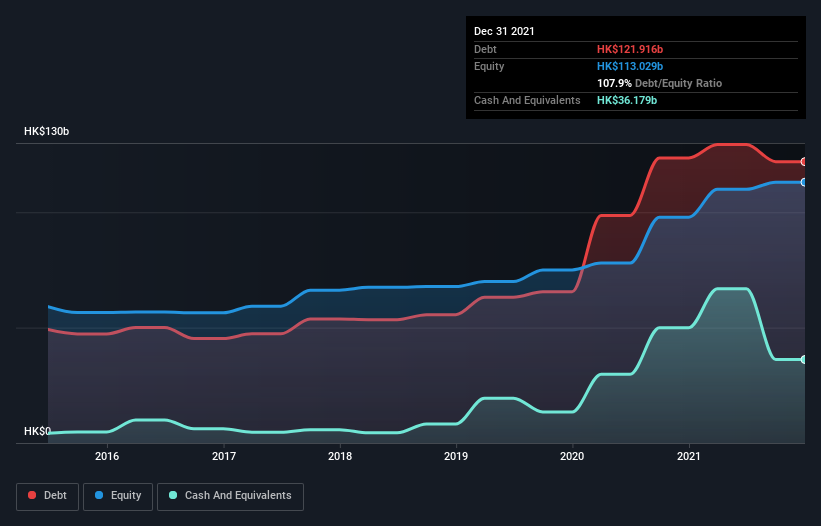- Hong Kong
- /
- Real Estate
- /
- SEHK:754
Does Hopson Development Holdings (HKG:754) Have A Healthy Balance Sheet?
Legendary fund manager Li Lu (who Charlie Munger backed) once said, 'The biggest investment risk is not the volatility of prices, but whether you will suffer a permanent loss of capital.' So it seems the smart money knows that debt - which is usually involved in bankruptcies - is a very important factor, when you assess how risky a company is. As with many other companies Hopson Development Holdings Limited (HKG:754) makes use of debt. But is this debt a concern to shareholders?
When Is Debt A Problem?
Debt assists a business until the business has trouble paying it off, either with new capital or with free cash flow. In the worst case scenario, a company can go bankrupt if it cannot pay its creditors. However, a more usual (but still expensive) situation is where a company must dilute shareholders at a cheap share price simply to get debt under control. Of course, the upside of debt is that it often represents cheap capital, especially when it replaces dilution in a company with the ability to reinvest at high rates of return. When we examine debt levels, we first consider both cash and debt levels, together.
View our latest analysis for Hopson Development Holdings
What Is Hopson Development Holdings's Debt?
The chart below, which you can click on for greater detail, shows that Hopson Development Holdings had HK$121.9b in debt in December 2021; about the same as the year before. However, it does have HK$36.2b in cash offsetting this, leading to net debt of about HK$85.7b.

How Healthy Is Hopson Development Holdings' Balance Sheet?
Zooming in on the latest balance sheet data, we can see that Hopson Development Holdings had liabilities of HK$129.0b due within 12 months and liabilities of HK$104.2b due beyond that. On the other hand, it had cash of HK$36.2b and HK$9.87b worth of receivables due within a year. So it has liabilities totalling HK$187.2b more than its cash and near-term receivables, combined.
This deficit casts a shadow over the HK$40.4b company, like a colossus towering over mere mortals. So we'd watch its balance sheet closely, without a doubt. At the end of the day, Hopson Development Holdings would probably need a major re-capitalization if its creditors were to demand repayment.
In order to size up a company's debt relative to its earnings, we calculate its net debt divided by its earnings before interest, tax, depreciation, and amortization (EBITDA) and its earnings before interest and tax (EBIT) divided by its interest expense (its interest cover). This way, we consider both the absolute quantum of the debt, as well as the interest rates paid on it.
Hopson Development Holdings has a rather high debt to EBITDA ratio of 14.2 which suggests a meaningful debt load. However, its interest coverage of 5.4 is reasonably strong, which is a good sign. Shareholders should be aware that Hopson Development Holdings's EBIT was down 68% last year. If that decline continues then paying off debt will be harder than selling foie gras at a vegan convention. There's no doubt that we learn most about debt from the balance sheet. But ultimately the future profitability of the business will decide if Hopson Development Holdings can strengthen its balance sheet over time. So if you're focused on the future you can check out this free report showing analyst profit forecasts.
Finally, a business needs free cash flow to pay off debt; accounting profits just don't cut it. So we clearly need to look at whether that EBIT is leading to corresponding free cash flow. Over the last three years, Hopson Development Holdings saw substantial negative free cash flow, in total. While investors are no doubt expecting a reversal of that situation in due course, it clearly does mean its use of debt is more risky.
Our View
To be frank both Hopson Development Holdings's EBIT growth rate and its track record of staying on top of its total liabilities make us rather uncomfortable with its debt levels. But at least its interest cover is not so bad. We think the chances that Hopson Development Holdings has too much debt a very significant. To us, that makes the stock rather risky, like walking through a dog park with your eyes closed. But some investors may feel differently. The balance sheet is clearly the area to focus on when you are analysing debt. But ultimately, every company can contain risks that exist outside of the balance sheet. For example Hopson Development Holdings has 4 warning signs (and 1 which is potentially serious) we think you should know about.
If, after all that, you're more interested in a fast growing company with a rock-solid balance sheet, then check out our list of net cash growth stocks without delay.
Valuation is complex, but we're here to simplify it.
Discover if Hopson Development Holdings might be undervalued or overvalued with our detailed analysis, featuring fair value estimates, potential risks, dividends, insider trades, and its financial condition.
Access Free AnalysisHave feedback on this article? Concerned about the content? Get in touch with us directly. Alternatively, email editorial-team (at) simplywallst.com.
This article by Simply Wall St is general in nature. We provide commentary based on historical data and analyst forecasts only using an unbiased methodology and our articles are not intended to be financial advice. It does not constitute a recommendation to buy or sell any stock, and does not take account of your objectives, or your financial situation. We aim to bring you long-term focused analysis driven by fundamental data. Note that our analysis may not factor in the latest price-sensitive company announcements or qualitative material. Simply Wall St has no position in any stocks mentioned.
About SEHK:754
Hopson Development Holdings
An investment holding company, primarily develops residential and commercial properties in China.
Adequate balance sheet and fair value.
Similar Companies
Market Insights
Community Narratives



